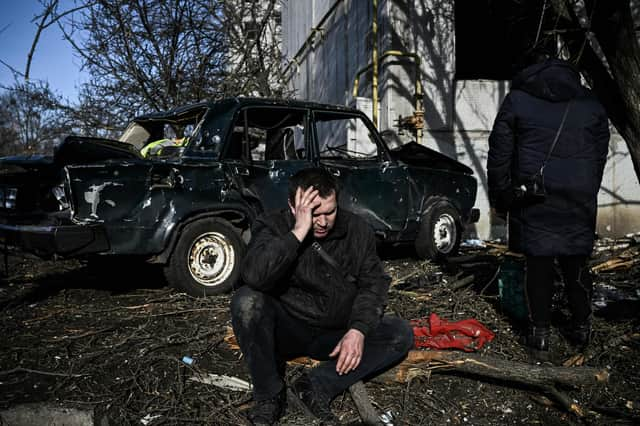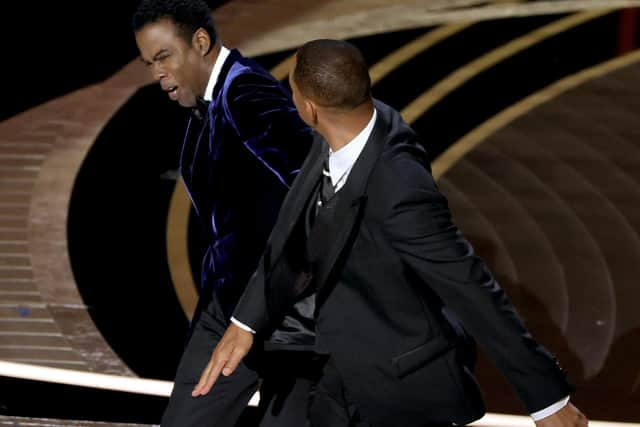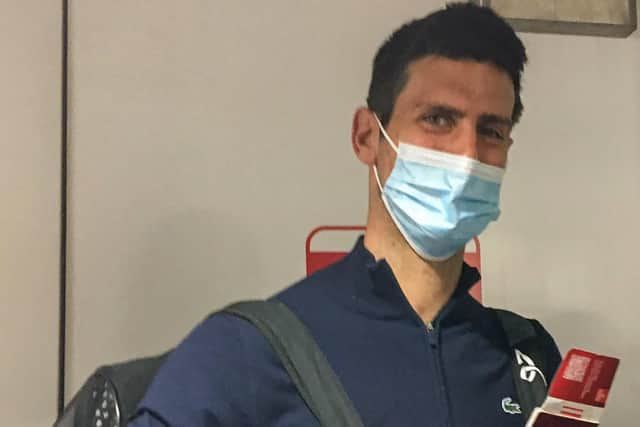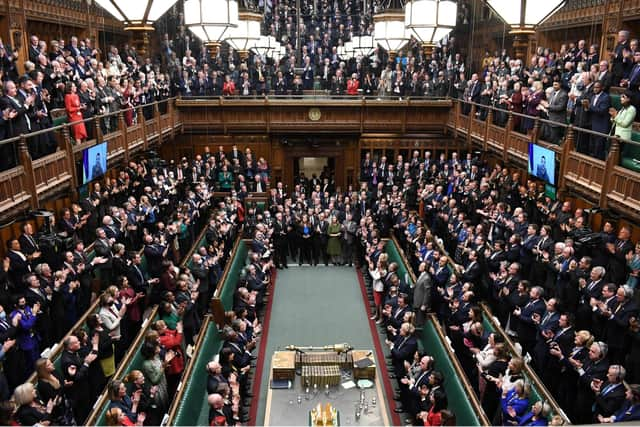Scotsman's review of the year part 1: War in Europe, controversy in sport and a slap at the Oscars


JANUARY
Scotland was still firmly in the grip of the coronavirus pandemic as the year began. Hogmanay celebrations were muted, with Edinburgh's street party among the events cancelled.
Teaching unions expressed concerns over children returning to classrooms, despite government advice for secondary pupils to take lateral flow tests before going to school.


Advertisement
Hide AdAdvertisement
Hide AdMeanwhile the Royal College of Nursing Scotland warned staff were struggling to leep up with rising rates of absence and Covid-related hospital admissions.
New rules that cut the required period of self-isolation for people who had tested positive were announced just as it emerged one in 20 Scots were thought to have had the virus in the last week of December.Businesses welcomed the move, which brought Scotland into line with the rest of the UK. But with cases continuing to soar, health boards warned of "extreme" strain on the NHS and staff absences hit their highest levels since June 2020.
Travel agents and airlines saw bookings rocket by up to 150 per cent as Covid test requirements were lifted by the Scottish Government. Fully vaccinated people returning to the UK were no longer required to take a test before travelling or self-isolate until they receive a negative test result after arrival.
Tennis star Novak Djokovic was deported from Australia, after the nine-time Australian Open champion lost a legal fight to stay in the country for the tournament while unvaccinated.


With plans unveiled to mark her Platinum Jubilee year, the Queen stripped Prince Andrew of his honorary military roles and royal patronages after a sexual assault lawsuit was filed against him in the US.
Boris Johnson's premiership came under intense pressure after it emerged he attended lockdown-busting parties at Downing Street. At Westminster, one of his newest MPs, Christian Wakeford, defected to Labour and former Tory cabinet minister David Davis told the prime minister: "In the name of God, go."
At Holyrood, the Equalities and Human Rights Commission urged ministers to undertake "more detailed consideration" around controversial proposed legislation on gender recognition laws.
As the month ended, Storms Corrie and Malik left thousands of Scottish homes without power and plunged the transport network into chaos.


FEBRUARY
Advertisement
Hide AdAdvertisement
Hide AdMr Johnson's grip on power became even less secure as February began with the publication of a damning interim report into "partygate" by senior civil servant Sue Gray, blaming "failures of leadership and judgment" in Number 10 for the scandal.
Raith Rovers football club faced a furious backlash after signing disgraced striker David Goodwillie, who had been ruled to be a rapist by a Court of Session judge.
The Bank of England set out a grim economic forecast, predicting the biggest blow to household income for more than 30 years amid rising inflation, soaring energy prices and a National Insurance tax hike.
As the cost-of-living crisis deepened, almost half of parents in Scotland said they were already finding it harder to pay their bills ahead of looming energy price rises, and that there was a "real risk" lives could be lost.
UK ministers set themselves on a collision course with Holyrood and environmental activists with plans to approve drilling at six new oil and gas sites. Campaigners said one of the proposed sites - Rosebank, off Shetland - is more than double the site of the controversial Cambo proposal that was put on ice in 2021 amid fierce opposition.
Both UK and Scottish governments set out proposals to help householders meet the cost of rocketing energy bills. SNP ministers came in for criticism for failing to target the most in need, after announcing alomst three-quarters of Scottish households would receive a £150 boost.
But focus was about to shift to Eastern Europe, as Russian president Vladimir Putin became increasingly belligerent on his country's border with Ukraine.
Mr Johnson called on Putin to step back from the "edge of the precipice" and urged allies to "yank out that hypodermic drip feed of Russian hydrocarbons that is keeping so many European economies going".
Advertisement
Hide AdAdvertisement
Hide Ad"We need to find alternative sources of energy and get ready to impose some very, very severe economic consequences on Russia," he said.
The Prime Minister prepared to end all Covid restrictions in England as it emerged the Queen had tested positive for the virus. Two days later, Ms Sturgeon then said all Scotland's legal restrictions would be lifted on March 21.
On February 24, Russia launched a full-scale invasion of Ukraine. Russian tanks rolled into Kyiv, where volunteers were handed 18,000 machine guns. Meanwhile, the UK, US and EU imposed personal sanctions against Putin. As the war descended into street fighting in Ukraine's second largest city Kharkiv, Putin put Russia's strategic nuclear deterrent forces on alert.
MARCH
The UK announced a full asset freeze on all Russian banks amid fears the war could last years.But Mr Johnson ruled out a Nato-enforced no-fly zone over Ukraine, despite satellite images revealing a 40-mile column of armoured vehicles, tanks and artillery advancing on Kyiv.
By March 3 Putin was accused of having already committed war crimes, with more than 2,000 civilians feared dead and almost a million more believed to have fled.
The Russian president was then accused of threatening "the safety of all of Europe" as Zaporizhzhia nuclear plant, the largest on the continent, was hit by shelling.
Amid reports of civilians being killed as they tried to escape the onslaught, Mr Johnson vowed to "tighten the vice" on Putin and announced a further £175 million in aid.
Meanwhile, the SNP's Westminster leader Ian Blackford suggested an independence referendum may not take place next year despite Ms Sturgeon's pledge in February a vote would take place by the end of 2023. Mr Blackford told those wanting immediate progress to be "mindful of where we are" given events elsewhere in the world.
Advertisement
Hide AdAdvertisement
Hide AdUkrainian president Volodymyr Zelensky reduced MPs to tears in a speech that invoked Sir Winston Churchill and William Shakespeare.Speaking from an unknown location in Kyiv, Mr Zelensky told the House of Commons: "We will fight until the end, at sea, in the air. We will continue fighting for our land, whatever the cost. We will fight in the forest, in the fields, on the shores, in the streets."
The following day, grim details began to emerge of the Russian shelling of a maternity and children's hospital in the besieged city of Mariupol. Mr Zelensky condemned the strike as an "atrocity".
Days after Mr Blackford's comments on independence, Scottish Greens co-leader Patrick Harvie told The Scotsman a second referendum should not be delayed due to global events, amid claims the war was being used as an excuse to block a vote.
Meanwhile, the economic impact of the war was starting to bite. Farmers warned of the "ultimate risk" of food shortages due to rocketing energy prices and spiralling inflation raising the cost of fertiliser.In other developments, P&O Ferries halted sailings for up to ten days after sacking 800 crew for cheaper substitutes. Staff were informed of their dismissals "with immediate effect" via video message.
The Duke and Duchess of Cambridge began a royal tour of the Caribbean that was criticised for having overtones from the colonial era.
Nazanin Zaghari-Ratcliffe returned home to the UK to be reunited with her husband and daughter after being released from six years of detention in an Iranian jail, where she had been accused of spying.
Hollywood star Will Smith made headlines for all the wrong reasons when he struck Oscars host Chris Rock in the face during the Academy Awards ceremony in Los Angeles.Business and hospitality leaders were left "bitterly disappointed" when Ms Strugeon failed to drop the legal requirement to wear face coverings in Scotland for a further two weeks in most settings.
Comments
Want to join the conversation? Please or to comment on this article.